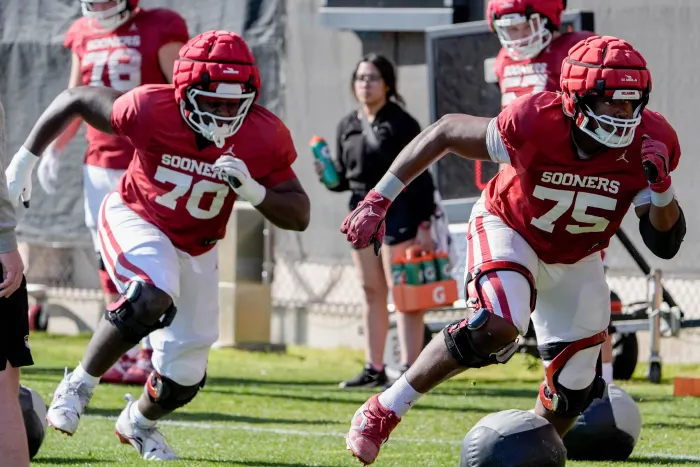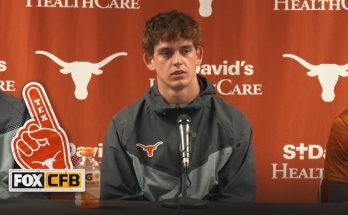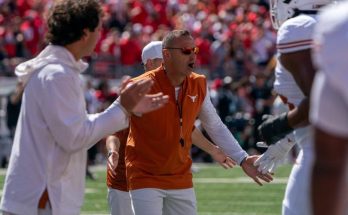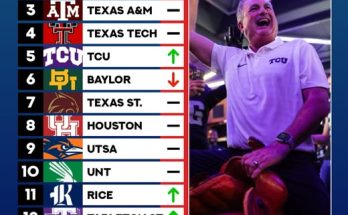In the ever-evolving landscape of college sports, the Name, Image, and Likeness (NIL) era has often been a double-edged sword. Critics warn about distractions and commercialization, while proponents champion the unprecedented opportunities for athletes to monetize their hard work and platforms. Amidst the noise, however, shining examples emerge—athletes who harness NIL not just for personal gain but to uplift their communities and inspire change. One such beacon of hope is the Oklahoma Sooners’ rising star, whose remarkable humanitarian efforts in Oklahoma City are redefining what it means to be a college athlete in 2025.
The Sooners’ standout wide receiver, Malik Thompson, has quickly become more than just a promising athlete on the gridiron. While his speed, hands, and instinctive route-running have earned him national attention and early whispers about a future in the NFL, it is his character and commitment off the field that have made him a beloved figure in the Oklahoma City community. As the first wave of college athletes navigates NIL opportunities, Malik’s story serves as a powerful reminder that with great visibility comes great responsibility—and the chance to use one’s platform to create meaningful impact.
Malik’s journey began long before his arrival at Norman, Oklahoma. Growing up in a modest neighborhood on the city’s east side, he experienced firsthand the challenges many families face: limited access to fresh food, inadequate youth programming, and a lack of safe spaces for children to thrive. Raised by his single mother, who juggled multiple jobs to keep the family afloat, Malik learned the value of hard work and community support early on. Football was his refuge, a way to channel his energy and dreams beyond the limitations of his surroundings.
When Malik committed to the Sooners, it was not just a personal triumph; it was a beacon of hope for the kids back home who saw in him a reflection of their own potential. But what truly set Malik apart was his refusal to forget where he came from. While many young athletes might focus solely on their training, schoolwork, and burgeoning brand deals, Malik made it a priority to reinvest in Oklahoma City in ways that would outlast his collegiate career.
Thanks to NIL, Malik was able to partner with several local businesses and nonprofits, creating a network of support for community programs focused on education, nutrition, and youth sports. One of his most impactful initiatives is the “Thompson Back-to-School Drive,” an annual event that has grown from a small gathering to a citywide campaign providing backpacks, school supplies, and scholarships to hundreds of children from underserved neighborhoods. Funded through a combination of Malik’s NIL earnings and generous contributions from sponsors, the drive has helped thousands of families prepare for the academic year with dignity and excitement.
Moreover, Malik’s partnership with Oklahoma City-based Fresh Start Markets has revolutionized access to healthy food options in food deserts across the city. Through targeted fundraising campaigns and awareness events, the collaboration has facilitated the opening of multiple fresh produce stands and affordable grocery hubs in areas previously plagued by limited grocery stores. Malik’s involvement goes beyond writing checks—he personally volunteers, participates in community cooking demonstrations, and speaks to local schools about nutrition and wellness. This hands-on approach resonates deeply with residents, who view Malik not only as a sports star but as a genuine advocate for their well-being.
Another cornerstone of Malik’s humanitarian work is the establishment of the “Sooners Youth Sports Initiative,” a nonprofit designed to provide free or low-cost sports programming for children in Oklahoma City. Recognizing the power of athletics to teach discipline, teamwork, and perseverance, Malik has leveraged his NIL platform to secure grants and sponsorships that cover equipment, facilities, and coaching staff. The initiative also emphasizes academic support, ensuring young athletes balance their sports involvement with educational success. By nurturing the next generation through both sports and schooling, Malik’s program aims to break cycles of poverty and create pathways to brighter futures.
The impact of Malik Thompson’s efforts has not gone unnoticed. Oklahoma University’s athletic department has praised his leadership, noting that he embodies the values they hope to instill in all their student-athletes. Local officials and community leaders have repeatedly lauded Malik for his vision and dedication, crediting him with fostering a spirit of hope and renewal in neighborhoods that have long been overlooked. Several national media outlets have featured Malik’s story as a prime example of how NIL can serve as a force for good, countering stereotypes that it merely encourages vanity and self-interest among college athletes.
At a time when NIL deals often revolve around endorsements, social media sponsorships, and sometimes controversial branding choices, Malik’s approach feels refreshingly authentic. He uses his growing visibility to shine a spotlight on the everyday struggles faced by many Oklahomans and mobilizes resources to address those needs. His message is clear: being a college athlete is not just about personal glory or financial gain—it’s about giving back and making a lasting difference.
For Malik, the motivation stems from a deeply personal place. In interviews, he often credits his mother and the tight-knit community that raised him as the driving forces behind his commitment to service. “I know what it’s like to feel forgotten, to face barriers just because of where you come from,” Malik has said. “If I can use my platform to change that for even one kid, then it’s all worth it.” His humility and passion have won over teammates, coaches, and fans alike, making him one of the most respected voices in Oklahoma sports.
As Malik’s football career continues to ascend, with scouts already circling and media attention intensifying, there remains a consistent focus on his humanitarian mission. He has spoken openly about wanting to build a sustainable legacy that outlives his playing days, envisioning foundations and community centers that will continue to serve Oklahoma City long after he’s retired. This long-term vision underscores a maturity beyond his years and reinforces the positive narrative surrounding NIL.
Malik’s story also challenges the prevailing skepticism surrounding NIL’s influence on college athletics. While the landscape is still new and evolving, his example proves that NIL can empower athletes to become entrepreneurs, philanthropists, and community leaders. Instead of succumbing to distractions or commercializing themselves in shallow ways, players like Malik are pioneering a model of responsible, values-driven use of their name and image rights. They show that the future of college sports is not just about the games played on the field but about the lives transformed off it.
Community members involved in Malik’s initiatives repeatedly emphasize the tangible benefits they’ve seen. From increased school attendance and higher academic performance to improved health outcomes and safer recreational environments, the ripple effects of his work have touched countless lives. Parents express gratitude for the opportunities their children now have to engage in positive activities and envision a brighter future. Local business owners appreciate the boost to the economy and the strengthened ties between sports, commerce, and civic pride. In essence, Malik’s NIL-driven humanitarianism has become a cornerstone of community resilience.
Beyond Oklahoma City, Malik Thompson’s story is inspiring a new generation of athletes nationwide. His use of NIL to drive social change serves as a blueprint for others seeking to balance athletic ambition with meaningful community impact. Colleges and athletic programs are increasingly encouraging their players to think beyond contracts and endorsements—to ask themselves how they can be agents of good in the world around them. Malik’s success illustrates that such aspirations are not only possible but profoundly rewarding.
As the NCAA and conferences continue to navigate the complexities of NIL regulations, Malik’s approach offers a hopeful perspective. By prioritizing integrity, authenticity, and service, he demonstrates that NIL is not inherently good or bad—it is what the athlete makes of it. For every cautionary tale of distraction or exploitation, there is a Malik Thompson proving that college athletes can rise above, using their newfound power to create opportunities for others and build stronger communities.
In the grand tapestry of Oklahoma Sooners football, Malik’s name will be remembered not just for touchdowns scored or records broken but for the lives changed and the hope ignited across Oklahoma City. His journey exemplifies the true spirit of collegiate athletics—competition, growth, and community—and serves as a reminder that greatness is measured not only by stats but by the difference one makes in the world.
As fans cheer for Malik on game days, they also rally behind a young man who is showing the best side of NIL: a force for good, a platform for change, and a testament to the power of sports to unite and uplift. The story of Malik Thompson and the Oklahoma Sooners is a story of promise, purpose, and progress—one that will inspire athletes and communities for generations to come.



